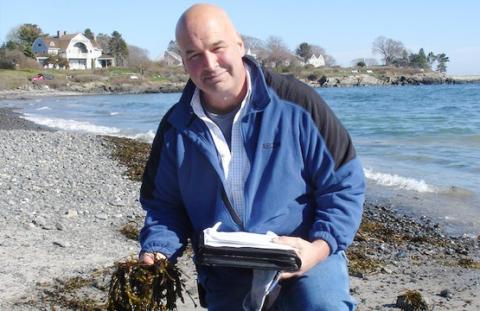
Look seriously at taking a minor in a field that compliments marine science, such as organic chemistry, biostatistics, etc. You'll be amazed at how quickly your experience and qualifications will develop.
Education
- B.A., Biology, Plymouth State University
- M.S., Zoology, University of New Hampshire
Contact
What is your current job and what does it entail?
I am currently working as a marine scientist for a major oil company in Houston, Texas. I provide technical support on marine science issues related to the company's deepwater exploration and production efforts, and for the decommissioning of offshore platforms at the end of their production life. I am also an environmental unit leader for the company's emergency response team.
What was the key factor in your career decision?
I started my career in environmental consulting shortly after completing my M.S. at the University of New Hampshire. As my career progressed, I developed extensive experience and contacts in the oil and gas industry. When an opportunity arose to work directly for a major oil company I applied for the position.
What do like most about your career?
I enjoy working with other scientists and engineers on meeting some of the challenges for operating in marine environments. I particularly enjoy developing innovative approaches to solving some of the technical issues that arise with deep sea operations. I also enjoy tracking emerging trends in ocean policy, and providing guidance to the company's leadership for meeting the resulting regulatory challenges.
What do you like least about your career?
I would have to say the lack of field work. I spent a lot of my time working in the field while in environmental consulting and enjoyed the diversity of project locations. Presently, any field work that my company requires is handled by many of the same environmental firms that I worked for in the past.
What do you do to relax?
Fly back to New Hampshire to spend time with my family. My son is in high school there and my daughter is attending UNH. I enjoy catching as many of his football games and her horse shows as possible. When in Texas, I enjoy jogging along a local bayou near my home and hitting the gym at work. Exercise is a big stress release for me, and I try to work it in a couple of times a day.
Who are your heroes/heroines?
Educators. I had an opportunity several years ago to temporarily teach inorganic and organic chemistry at a private school near our home in New Hampshire. It was a demanding, but highly rewarding experience for me. Many of the teachers that I was working with had the very same qualities that reminded me of teachers who had touched my life: a deep interest in their area of study, enthusiasm for sharing their experience and motivating their students, and the recognition that every student has something that they can bring to the classroom. I often think of the teachers that inspired me to become an ecologist, and that was over 30 years ago.
What advice would you give a student who expressed an interest in pursuing a career in your field?
Try to get some experience in the marine sciences by working as a library assistant, laboratory assistant or teaching assistant. Ask your science teachers or guidance counselors if they can help you find such an opportunity at local colleges, government agencies or private firms. You might be able to find a job sorting biological samples, prepping labs, conducting computer searches, entering data or even assisting in fieldwork. Get some training: scuba diving, certified rescue diving, CPR/first aid, or a U.S. Coast Guard license to operate a boat. Many of these skills are highly sought after if you want to conduct field work in the marine sciences. Whatever you can do now will only help you when you apply to college. Once at college, get to know your professors' interests and apply for a work-study position with them. Look seriously at taking a minor in a field that compliments marine science, such as organic chemistry, biostatistics, etc. You'll be amazed at how quickly your experience and qualifications will develop.
Are career opportunities in your field increasing or decreasing and why?
I believe opportunities are increasing, but the competition for a position within the oil and gas industry is high and job openings are infrequent. Scientists with experience in deepwater ecology, ecosystem services valuation, environmental impact assessment, risk assessment, and oil spill response are valued by this industry.
What will you be doing 10 years from today?
Still working in the oil and gas industry, but planning my transition into retirement. I hope to go back into teaching at that time, rather than retire outright. Ideally, I would like to design/teach a course in applied marine science with an extensive field work laboratory.

